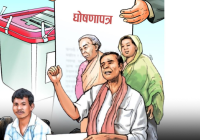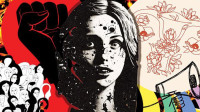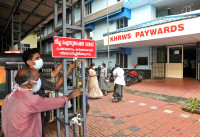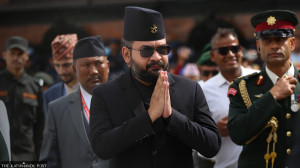Opinion
A divided self
The notion of Nepali nationalism which excludes the Madhesis and Tharus will only weaken the nation
Bhabes Kumar Labh & Laxmi Prasad Ojha
The strained relations between the Madhes and Nepali state further deteriorated after the promulgation of the new constitution. As protests in the Tarai began right after release of the first draft of the statute, there were clear indications that the situation could further worsen if the document was promulgated without making necessary amendments. Yet, the three major political parties—the Nepali Congress, the CPN-UML and the UCPN (Maoist)—were so blinded by their own vested political interests that they failed to understand the gravity of the situation.
When the new constitution failed to adequately address the aspirations of the Madhesis and Tharus, their sense of alienation from the state manifested into a full-fledged agitation. The document restrains their fair access to power by limiting their political representation, and thus bolsters the traditional ‘ethnic’ status quo at the centre. The Nepali state has always considered the Madhes to be the bread basket of the country but treated the Madhesi people as outsiders. It reacted belligerently to their protests by killing more than 40 people in the first month of the protest alone.
Now, the over 100-day long agitation has turned into a civil rights movement. This is no longer just a protest of the Samyukta Loktantrik Madhesi Morcha—a coalition of four Madhesi parties protesting against the constitution. Rather, the whole of the Madhes has revolted against the state demanding fair rights and social justice. Yet, some prominent leaders of the major political parties and even media personnel pretend to be unaware about the demands of the Madhes Movement. With every passing day, society is further getting polarised and there’s a palpable threat of communal violence. The ruling coalition, however, is busy beating the nationalistic drum.
Nationalist frenzy
The Madhes Movement has triggered a wave of nationalist rhetoric in Nepali newspapers and social networking sites. The state apparatus, the ruling class, and the mainstream media have always understood nationalism from the Pahadi people’s perspective. They envision Nepal, to quote Benedict Anderson, a renowned nationalism scholar, as ‘an imagined community’ consisting only of people who wear daura-suruwal-topi and speak Nepali. Even Indian nationals with these features are heartily accepted as Nepalis but not the people living in the southern plains who dress differently and speak another language. The Madhesis are still considered as outsiders. Clearly, the state is muddling the notions of ethnicity and language with that of nationalism. This is simply unacceptable in a multilingual and multicultural country like Nepal. Until ‘Nepali nationalism’ continues to imply an imagined community consisting only of Pahadis, it will remain exclusionary and xenophobic.
Unfortunately, the current ruling coalition seeks to protect such nationalism at any cost even if that means being indifferent and apathetic to the rights of the historically marginalised communities. There can be no other way to make sense of indiscriminate firing at protestors in eastern and mid Tarai, which has left over 50 civilians dead so far. Some of the protesters were reportedly first captured and then shot from close range by security personnel. The culprits who lynched seven police personnel in Tikapur , however, should also be brought to justice. But that lamentable incident cannot be used as a justification by the Nepal Police to antagonise the entire Madhesi-Tharu communities and brutally kill the protestors as retribution. The self-proclaimed messiahs of humanity in Kathmandu showed little empathy towards the Madhesi people who were killed mercilessly at the hands of the security personnel. The killing spree by the Nepali security forces stopped only after the protest shifted to the Nepal-India border points. It was a grave mistake on part of the state to use brutal force instead of engaging in talks with the dissenters.
Blame game
Despite this reality, Nepali newspapers are replete with jingoistic columns exploring the long-term negative effects on the Nepali’s psyche and its consequent threat to India due to the ‘unofficial blockade’. But if these nationalists genuinely care for Nepal, why are they not concerned about the possible consequences of suppressing the voices of Madhesis and Tharus with bullets? Moreover, the bad relations between India and Nepal will definitely improve sooner or later. For, the so-called nationalists and patriots in the government will need—as the Nepali rulers have in the past—suggestions and guidance from Nepal’s ‘big brother’. To give an example, nationalists back in Nepal sighed with relief when Deputy Prime Minister Kamal Thapa—in his recent ‘unofficial’ visit to Delhi Darbar—received some remedial instructions.
Redefining nationalism
The crisis in the Madhes cannot continue forever too. But the psychological wound that it has inflicted on the Madhesis and Tharus is unlikely to heal very quickly. And it is sure to seriously threaten national unity in the future. Unruly acts of the protestors like pelting stones on passenger buses at nights and setting ambulances on fire will not help social cohesion either.
The ruling coalition led by Prime Minister Oli has reiterated its stand to protect nationalism at any cost. But does nationalism require protection? Shouldn’t social cohesion and protecting the rights of the marginalised be more of a priority for the government than nationalism that appeals to just a one socio-cultural group? The government must be accountable to all its citizens. When a nation heartily accepts all its peoples and provides ensures their rights, nationalism will automatically become more inclusive in character and, hence, grow stronger. The traditional notion of Nepali nationalism that excludes the Madhesis and Tharus will only weaken the nation. The concept of Nepali nationalism and national identity, therefore, needs to be redefined by freeing it from the dogma of any particular region, religion and language.
Labh is a lecturer at Sarswati Multiple Campus and Ojha is a lecturer at Central Department of English Education, Tribhuvan University




 7.12°C Kathmandu
7.12°C Kathmandu










